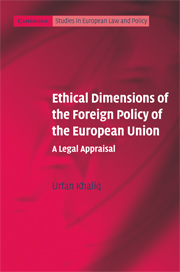Book contents
- Frontmatter
- Contents
- Series Editors' Preface
- Acknowledgements and Preface
- The Constitutional Treaty and the Reform Treaty: Table of Equivalences
- Table of Cases
- Table of Treaties
- List of Abbreviations
- 1 Introduction
- 2 Promoting Values in Foreign Relations: Policy and Legal Issues
- 3 Promoting Values and the International Relations of the Union and Community: Competence and Practice
- 4 Ethical Values and Foreign Policy in Practice: Responses to the Denial of Democracy in Myanmar, Nigeria and Pakistan
- 5 Ethical Values and Foreign Policy in Practice: the Role of the Union in the Middle East Peace Process and Relations with the Palestinian Authority and Israel
- 6 Ethical Values and Foreign Policy in Practice: Humanitarian Aid and the European Union
- 7 Conclusions
- Select Bibliography
- Index
1 - Introduction
Published online by Cambridge University Press: 03 December 2009
- Frontmatter
- Contents
- Series Editors' Preface
- Acknowledgements and Preface
- The Constitutional Treaty and the Reform Treaty: Table of Equivalences
- Table of Cases
- Table of Treaties
- List of Abbreviations
- 1 Introduction
- 2 Promoting Values in Foreign Relations: Policy and Legal Issues
- 3 Promoting Values and the International Relations of the Union and Community: Competence and Practice
- 4 Ethical Values and Foreign Policy in Practice: Responses to the Denial of Democracy in Myanmar, Nigeria and Pakistan
- 5 Ethical Values and Foreign Policy in Practice: the Role of the Union in the Middle East Peace Process and Relations with the Palestinian Authority and Israel
- 6 Ethical Values and Foreign Policy in Practice: Humanitarian Aid and the European Union
- 7 Conclusions
- Select Bibliography
- Index
Summary
In their foreign policies states have historically, in the main, sought directly to protect only their own interests. During the last thirty years or so, various administrations have formally declared that in their foreign policy formulation, acting either individually or collectively, they will take account of human rights, good governance and democracy, among other values. The European Union's current constitutive treaties expressly refer, for example, to the objectives of promoting and protecting human rights and democracy in third states. The Council, Presidency, the European Parliament, various Commissioners and the Commission have all on numerous occasions declared their desire to achieve those objectives and the methodology to be used in their pursuance.
Foreign policies which promote certain ‘ethical’ values and principles have often been theoretically analysed by International Relations scholars. This work is of interest and value but ‘ethical foreign policies’ also involve many questions of domestic and international law. Law is, therefore, as important a tool as International Relations in the analysis of such policies. This book analyses the European Union's efforts to this end in legal terms, to understand how and on what basis action (if any) is taken and how effective it has been or is likely to be. This study will focus on the European Union's relations with a number of primarily developing states. As a legal analysis of the European Union's ‘ethical foreign policies’ and practice, this study does not attempt to engage itself in the International Relations debates, although it does refer to them where necessary.
- Type
- Chapter
- Information
- Ethical Dimensions of the Foreign Policy of the European UnionA Legal Appraisal, pp. 1 - 6Publisher: Cambridge University PressPrint publication year: 2008

